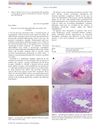 20 citations,
January 2015 in “Polish Journal of Pathology”
20 citations,
January 2015 in “Polish Journal of Pathology” Reflectance confocal microscopy is a useful, non-invasive tool for diagnosing some skin diseases, with potential for future improvements.
 33 citations,
May 2006 in “Journal of Investigative Dermatology”
33 citations,
May 2006 in “Journal of Investigative Dermatology” PTHrP and its receptor can control blood vessel growth and hair development in mouse skin.
 14 citations,
December 2007 in “Pediatric allergy and immunology”
14 citations,
December 2007 in “Pediatric allergy and immunology” Newborns with the common rash Erythema Toxicum have many active mast cells in their skin, but these cells don't produce the LL-37 peptide.
 8 citations,
November 1990 in “Archives of Dermatology”
8 citations,
November 1990 in “Archives of Dermatology” A woman with EMS showed unusual skin mucinosis without the typical hard skin syndrome, suggesting EMS can cause skin mucinosis.
 7 citations,
March 2019 in “Journal of The European Academy of Dermatology and Venereology”
7 citations,
March 2019 in “Journal of The European Academy of Dermatology and Venereology” A man developed a skin reaction from metronidazole, which improved after stopping the drug and starting steroids.
7 citations,
August 2017 in “Journal of dermatological science” Sorafenib causes skin reactions by increasing the number and activity of skin mast cells.
 1 citations,
January 2023 in “Cutis”
1 citations,
January 2023 in “Cutis” You might not need to stop cancer treatment if you get a rare skin reaction from EGFR inhibitors, as skin treatments can help manage it.
 September 2022 in “XXXIX Congresso Brasileiro de Reumatologia”
September 2022 in “XXXIX Congresso Brasileiro de Reumatologia” Tofacitinib may effectively treat skin symptoms in difficult cases of dermatomyositis.
 July 2003 in “Journal of Cutaneous Medicine and Surgery”
July 2003 in “Journal of Cutaneous Medicine and Surgery” Skin problems are common in Bangladesh due to arsenic, prompt treatment of diabetic foot ulcers is crucial, maternal transmission causes most neonatal herpes, treatments for pediatric vasculitis are effective, the chickenpox vaccine works, more frequent UVB therapy helps psoriasis, certain jobs increase hand dermatitis risk, monoclonal antibodies treat psoriasis well, lifestyle affects psoriasis, alefacept improves psoriasis, imiquimod cream partially clears basal cell carcinoma, and iron may not help chronic hair loss.
 July 1976 in “Archives of Dermatology”
July 1976 in “Archives of Dermatology” Sun exposure and corticosteroid use are linked to a skin condition, aseptic necrosis can happen with different wart treatments, and hair loss might be caused by hormone injections and dieting.
245 citations,
October 2015 in “Nature medicine” Hair follicle-derived IL-7 and IL-15 are crucial for maintaining skin-resident memory T cells and could be targeted for treating skin diseases and lymphoma.
 172 citations,
November 1983 in “Journal of The American Academy of Dermatology”
172 citations,
November 1983 in “Journal of The American Academy of Dermatology” Chemotherapy can cause skin problems like hair loss, mouth sores, and skin darkening, and recognizing these can affect treatment decisions.
 114 citations,
April 2004 in “International Journal of Dermatology”
114 citations,
April 2004 in “International Journal of Dermatology” Postinflammatory hyperpigmentation causes dark skin patches and needs personalized treatment.
 40 citations,
August 2010 in “Archives of dermatology”
40 citations,
August 2010 in “Archives of dermatology” A 5-year-old boy's skin condition improved with systemic valganciclovir after a cardiac transplant and immunosuppressive therapy.
36 citations,
June 2015 in “International journal of toxicology” Trichloroethylene causes skin inflammation in mice by increasing certain immune proteins.
 18 citations,
March 1990 in “Archives of Dermatology”
18 citations,
March 1990 in “Archives of Dermatology” Cyclosporine cleared a woman's resistant skin condition quickly and kept it away for over a year.
 11 citations,
August 2010 in “Pediatric dermatology”
11 citations,
August 2010 in “Pediatric dermatology” Tacalcitol cream effectively and safely treated a rare skin condition called Lichen Spinulosus in two cases.
 6 citations,
September 1990 in “International Journal of Gynecology & Obstetrics”
6 citations,
September 1990 in “International Journal of Gynecology & Obstetrics” The skin condition PUPP usually gets better on its own after giving birth and is unlikely to happen again in future pregnancies.
 5 citations,
August 2014 in “Australasian journal of dermatology”
5 citations,
August 2014 in “Australasian journal of dermatology” Sorafenib can cause delayed skin problems, so patients need careful monitoring.
 4 citations,
July 2019 in “Clinics in Dermatology”
4 citations,
July 2019 in “Clinics in Dermatology” The document concludes that while white skin, nail, and mucosa diseases increase skin cancer risk, they are generally harmless, especially compared to darker pigmentation conditions.
 2 citations,
May 2017 in “The Journal of Dermatology”
2 citations,
May 2017 in “The Journal of Dermatology” A Japanese bone marrow transplant patient developed a rare skin cancer possibly linked to long-term use of the medication voriconazole.
 1 citations,
June 2013 in “Medicine”
1 citations,
June 2013 in “Medicine” A thorough skin history and full examination are important for diagnosing and understanding the impact of skin diseases.
1 citations,
September 2021 in “Advances in skin & wound care” SARS-CoV-2 might infect and multiply in skin tissue, possibly aiding in its transmission.
 1 citations,
May 2017 in “Journal of The American Academy of Dermatology”
1 citations,
May 2017 in “Journal of The American Academy of Dermatology” The moisturizer with phytol improved skin texture and reduced fine wrinkles better than the moisturizer without it.
February 2023 in “Biological and Clinical Sciences Research Journal” Chemotherapy often causes hair loss, mouth sores, and dry skin.

A thorough skin history and examination are essential for diagnosing and treating skin conditions effectively.

Chemotherapy can cause skin issues and hair loss, and this guide explains how to manage them.
 January 2007 in “Journal of The American Academy of Dermatology”
January 2007 in “Journal of The American Academy of Dermatology” Propylthiouracil, a thyroid medication, can cause skin blood clots and immune-related blood vessel inflammation.
 December 2004 in “Medicine”
December 2004 in “Medicine” A thorough history and examination are crucial for diagnosing skin diseases, which affect up to a third of people. This includes details about skin lesions, medication, general health, lifestyle, family, and contacts, as well as examining the rash, hair, nails, and mucous membranes. Changes in hair and nails can also indicate other medical and skin disorders.
 July 2003 in “Journal of Cutaneous Medicine and Surgery”
July 2003 in “Journal of Cutaneous Medicine and Surgery” Various skin conditions like cutaneous lupus erythematosus, psoriasis, and basal cell carcinoma can be effectively treated with antihypertensive agents, NB-UVB phototherapy, and imiquimod cream respectively. Vaccines are effective against genital herpes and HPV-16 infection. Early intervention is crucial for conditions like diabetic foot ulcers and neonatal herpes. Certain dyes can cause hand dermatitis, and there's a link between smoking/drinking and psoriasis in men. No direct link was found between low iron levels and chronic hair loss in women.

























